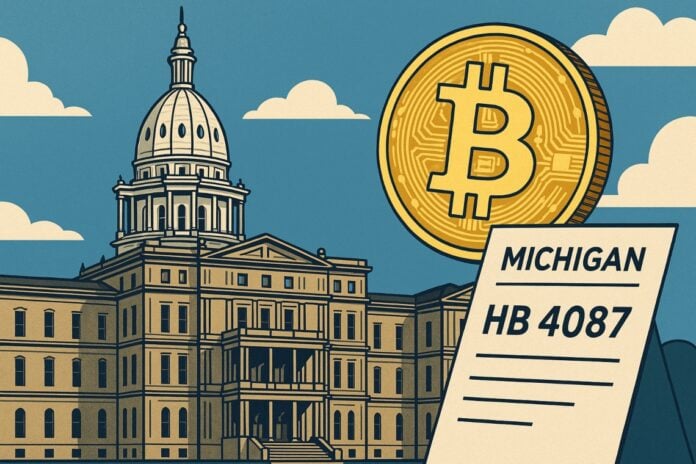The Michigan House has resumed consideration of HB 4087, the proposal that, if approved, would authorize the allocation of up to 10% of public funds – specifically from the General Fund and the Budget Stabilization Fund – in Bitcoin and other digital assets.
The measure, currently in second reading, reignites the debate on a potential financial shift for Michigan, highlighting operational risks and accounting transparency. In this context, the balance between investment opportunities and risk control becomes central.
According to data collected by the Government Finance Officers Association (GFOA), public administrations must evaluate with extreme caution the direct use of cryptocurrencies in the management of reserves or treasury.
Industry analysts we consulted note that the absence of unified standards on custody, reporting, and impairment significantly increases operational and reputational risk for entities with complex public budgets.
In monitoring state legislative acts, it is highlighted that the quality of implementing rules will be crucial to reducing informational asymmetries and systemic risks.
Summary
HB 4087: what’s really at stake
The draft law, proposed by representatives Bryan Posthumus and Ron Robinson, would allow investing up to 10% of state public funds, an amount that in absolute terms could reach billions of dollars, with potential repercussions on the state’s budget and liquidity management (Michigan Legislature).
The provision focuses on creating a reserve in Bitcoin and other selected digital assets, with the measure assigned to the Government Operations Committee for further examination and possible amendments.
That said, the core of the proposal remains the construction of a reserve that is consistent with public finance constraints and the demand for transparency from stakeholders.
Legislative Timeline: Steps and Next Moves
The proposal, currently in its second reading, will need to go through committee work before it can return to the Chamber for the final vote. The scheduling, currently underway, reflects a political priority, although the legislative process could be extended due to amendments, technical opinions, and in-depth analysis of budget impacts.
It should be noted that the timing and content of the amendments will directly affect the operational governance of the future reserve.
Custody and Audit: What We Know (and What’s Missing)
HB 4087 focuses on aspects of custody, cybersecurity, and audit, while deferring many specifics to future implementing rules.
The draft provides for security obligations and accounting controls for risk management, although it does not set precise standards in areas such as cold storage, multisig solutions, asset segregation, compliance with standards (e.g., SOC 2), and the use of independent auditors.
Yet, this is where the main issue lies: governance, in fact, remains entrusted to the state Treasury offices, which will then have to define the criteria for accountability, metrics, and frequency of controls.
Why Michigan’s Move Can Set a Precedent
If approved, the law could trigger a domino effect, prompting other American states to reconsider the use of public funds for investments in digital assets. Michigan would thus join a path already taken by states like Texas, New Hampshire, and Arizona.
Furthermore, the price of Bitcoin – estimated to be around $117,000 as of September 19, 2025 – fuels the debate: critics argue that Michigan might be buying near market highs. Indeed, the time horizon and entry rules become crucial to contain volatility.
Confrontation in the USA: where we are and who is pushing
The Michigan dossier fits into an evolving national context. According to BitcoinLaws.io, over 25 states (data updated to September 2025) are examining similar proposals.
Among these, Texas, New Hampshire, and Arizona have already initiated studies or proposals for Bitcoin reserves, while states like Illinois, Ohio, and Pennsylvania might be incentivized to reassess their strategies to avoid falling behind.
At the federal level, there are requests circulating in Congress to initiate studies on the feasibility of a national Bitcoin reserve, focusing on aspects of custody, cybersecurity, and accounting standards. However, the fragmentation of initiatives requires constant monitoring of the different legislative processes.
Tax and Accounting Implications
Accounting for Bitcoin on the balance sheet will require clear valuation criteria and impairment tests, as market volatility impacts provisions and the presentation of risk to state stakeholders.
It will be essential to define precise policies, such as the methods and timing of realization for liquidity needs, as well as ensure transparency through periodic reports on costs, risks, and reserve performance. In this context, coordination with state and federal accounting standards will remain a key element.
Prices, timing, and peak risk
With the price of Bitcoin estimated around $117,000 on September 19, 2025, critics note the danger of the State entering the market near the highs.
That said, a tranche entry policy, with exposure limits and stress tests, could be adopted to mitigate the risk related to the timing of purchases. Yet, the preemptive definition of scenarios and operational thresholds remains crucial to avoid reactive decisions.
Corporate and Market Signals
A recent report by K33 Research highlights that about 25% of publicly traded companies with a portion of their treasury in Bitcoin are trading below the actual value of their reserves.
This indicates that market perception remains selective and suggests that, in the absence of robust governance and transparent disclosures, the equity channel may penalize financial strategies not accompanied by solid control mechanisms. In other words, without verifiable processes, the market premium can turn into a discount.
Open Questions for the Legislator
- What minimum mandatory standards will be imposed for custody and audit?
- How will counterparty risk and operational responsibilities be managed?
- What is the absolute value of the funds to which the 10% will be applied and what will be the allocation schedule?
In summary
HB 4087 represents a potential breakthrough for Michigan’s state reserves, allowing up to 10% investments in Bitcoin and other digital assets.
However, numerous technical aspects remain to be defined, particularly regarding custody, audit, risk management, and accounting clarity. The game is now being played between the Chamber and the committees, while other states are watching closely, ready to move on the national scene.
Key Data at a Glance
- Maximum allocation: up to 10% of general and stabilization funds.
- BTC price: estimated around $117,000 on September 19, 2025.
- Operational node: future definition of custody and audit standards in the implementing rules.




